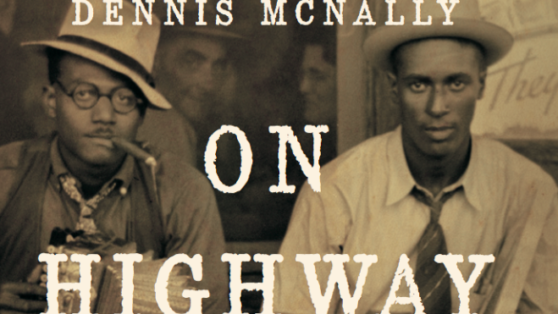‘The Blues Always Been’: Dennis McNally’s On Highway 61

A carefully researched and well-written overview of “the music of freedom” runs out of gas halfway there.
I snagged On Highway 61: Music, Race and the Evolution of Cultural Freedom because I’d hoped to make concrete some whiffy assertions I’d been making on the Mark And Sarah Talk About Songs podcast about the co-optation of “race music” by “mainstream” white culture. How exactly was that committed, and by/against whom? Was my sense that much of white America’s attempts to reject or tame jazz, or Elvis, or anything else that read “too black” was rooted in a sexual anxiety accurate? I clicked around on Amazon for awhile, looking for a book that might give me a half-decent grounding in the relationship of American popular music and race, without repeating the word “paradigm” too many times.
McNally brings an academic tone and depth to his writing, but it isn’t cobwebby, just knowledgeable (with the occasional regrettable lapse into argot about flatted sevenths, but it’s not as though he might not expect many of his readers to know better than I how music is physically made). The prose is particularly successful when you consider the breadth of the subject he set himself, and he’s not afraid to insert his own opinions on various blues myths (Robert Johnson, primarily), which makes On Highway 61 more accessible.
But the book IS called On Highway 61, and yes, that road connects Minnesota, the upper reaches of which calved Bob Dylan, to the Delta…but you get the distinct feeling once the chapters-long meditation on Dylan that closes the book gets underway that McNally hit on this fact and subject first, and worked backwards to a broader pitch so as not to get eye-rolled out of his agent’s cubicle with a proposal for yet another exegesis on fucking Hattie Carroll. And you best believe he fits that in here.
I will say for McNally that this is by far the least irritating deep dive into Dylan’s sourcing and process that I’ve read; I was already so over ol’ Hattie that I was under her by…I’m going to say 1993?, but McNally’s bit on that song is smart and direct, and any discussion of Dylan that mentions “Talking Bear Mountain Picnic Blues” has the bona fides I’m looking for. But an entire section of the book, well over a hundred pages, is spent on Dylan, and it’s not that Dylan isn’t relevant to the blues tradition, or the evolution of “race music” from jazz to folk to the second post-Beatles wave of rock and roll. He is. McNally soon strays away from the parts of Dylan’s rise to fame that tie into his book’s subtitle, though, despite repeated references to Dylan/other folk tunes that became anthems of the civil-rights movement, and reading how “Masters Of War” came to be, I just kept thinking that the book McNally really wanted to do, and probably should have done, is an oral history of the musical tradition of the SNCC in the mid-sixties.
This book kind of unravels halfway through — it seems too like, once McNally reaches more recent times, he might have gotten overwhelmed by the sheer volume of information, and while I’m sympathetic to looking at Guralnick’s two-volume definitive work on Elvis Presley and thinking you shouldn’t bother reinventing the wheel(s), Presley is functionally brushed past, and in a book on American musical forms and race, that can’t happen, regardless of what you tell yourself about Presley’s disinterest in politics — but it’s very readable throughout, and the first half ties in fun quotes like the one in my headline from Big Eye Louis Nelson; observations about pinko newspapers folding with a quickness because they were “boring”; and the relationships of Mark Twain and Henry David Thoreau to musical iterations of American ideas of exceptionalism. And I can’t hate on a book that gave me this zinger about jazz from Henry Van Dyke — “Jazz music was invented by demons for the torture of imbeciles” — even if the author 1) patently doesn’t agree and 2) got me to listen to Miles Davis and think about some things.
So, maybe McNally didn’t write the book he wanted to, or meant to, but it’s one of those reads that fails in its inception and somehow still mostly works. If you’re not too busy getting someone to put together that oral history I mentioned, give it a spin.
Tags: Big Eye Louis Nelson Bob Dylan books Dennis McNally Elvis Presley Henry David Thoreau Mark And Sarah Talk About Songs Mark Twain MASTAS Miles Davis On Highway 61 Robert Johnson shut up jazz





